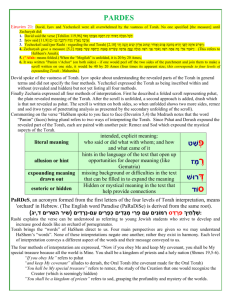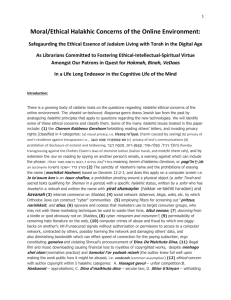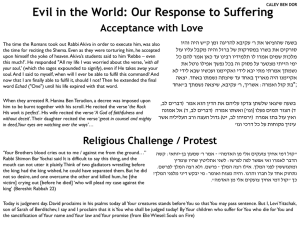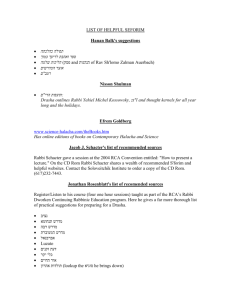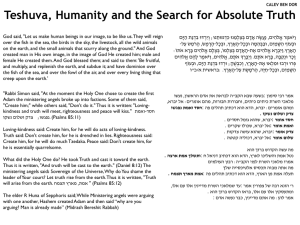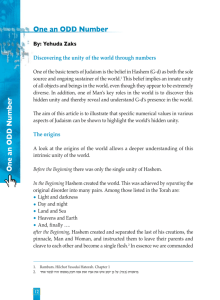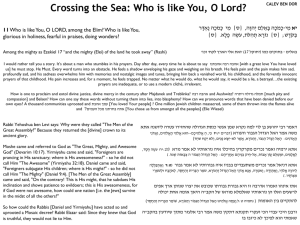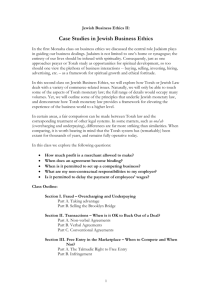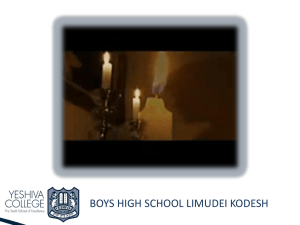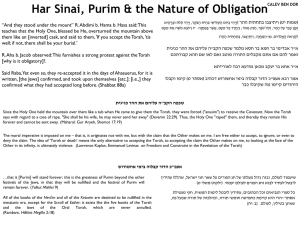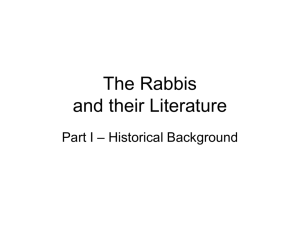Introduction - Association of Jewish Libraries
advertisement
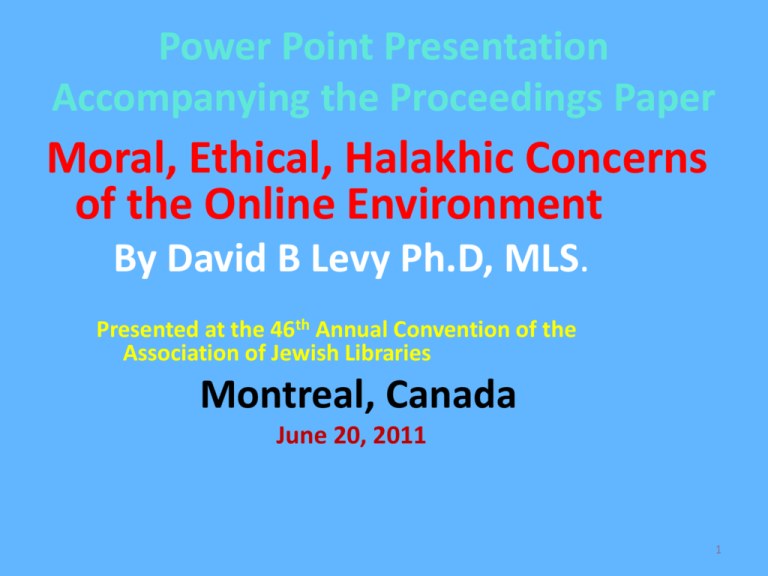
Power Point Presentation Accompanying the Proceedings Paper Moral, Ethical, Halakhic Concerns of the Online Environment By David B Levy Ph.D, MLS. Presented at the 46th Annual Convention of the Association of Jewish Libraries Montreal, Canada June 20, 2011 1 ETHICAL ISSUES OF THE ONLINE ENVIRONMENT OUTLINE [Due to time limits only sect. 1,2.5. & 12] (1) *Cherem Rabbenu Gershom : forbidden to read a person’s letters (i.e. privacy rights) (2) *To erase or not to erase the name of Hashem (mechikat Hashem) based on Devarim 12:2-3, and does this apply on a computer screen i.e. lo ta’asum ken is an issur chaftza, a prohibition pivoting around a physical object with a specific halakhic status vs. pixel liquid crystal glow in cathode tube of computer monitor via electron beam guided by magnetic field shot at screen (3) Internet commerce on Shabbat, (4) social network listserves, blogs, wikis, etc. by which Orthodox Jews create "cyber" communities (5) *employing filters for those screening out “pritzus, and stius, and narishkeit (6) spyware and cookies that marketers use to target consumer groups, who may not wish these marketing techniques be used to waste their time, bittul zeman with false advertising, g’nevas daas (7) davoning from a kindle or ipod obviously not (isssur) on Shabbos, (8) cyber minyanim and mizumem in the Blogisphere? (9) permissibility of censoring hate literature and neo-nazi groups on the web (censorship of violence) (10) piggy-backing on anothers Wi-fi unsecured signals without authorization to access a computer network contracted by others harming the network , damaging other’s data, & diminishing bandwidth which can effect speed of connection for the paying subscriber, ergo a form of geneiva (11) illegal film & music downloading causng financial loss to royalties of copyrighted works, despite minhago shel olam (normative practice) and hamotzi l’or yodeah mizeh (the author knew full well upon making the work public how it might be abused); umdenah (common assumption) (12) * ethical concern with author rights within 5 halakhic categories: A. Hasagat gevul -- unfair competition:B. Haskamot -- approbations; C. Dina d’malkhuta dina -- secular law; D. Shiur 2 Intent to gather, not field sheilahs & poskin halakhah • Intent to outline overview of basic framework of halakhic approach for online ethical issues. For practical guidance (halacha l’maaseh) consult an halakhic authority • Korah, the upcoming parasha for this Montreal AJL convention, involves the dangerous, disrespectful, and overly ambitious attempt of Korah to leverage the authority of Moshe and Aaron, by claiming the whole congregation, is holy etc. It is not my attempt at all to poskin halakhah but rather to gather some halakhic views of Gedolim as these relate to important ethical concerns of the online environment. Let us recall the Gedolim of the likes of R. Hayyim Ozer Grodzinski and Rav Soloveitchik, whose halakhic expertise, virtuosity, and agility sets them apart as clearly living in a galaxy made out of substance more precious than diamonds. The Rav’s hesped for R. Hayyim Ozer (Nosei HaTzitz VeHahoshen,” in Divrei Hagut, p. 187-194,] reveal that R. Hayyim Ozer holds that “the individual qualified to decide technical legal questions should also have authority over public political and policy decisions. The Rav is presenting R. Grodzinski’s position and not his own. 3 Privacy Issues A. Midrash Rabbah interprets the serpant/satan as a voyeur of Adam and Hava. B. Yosef was careful not to have anyone outside his family by privy to the tension that existed between brothers. Da’at Zekenim explains his thinking – why let Mitzreim know that there had been bad blood between the brothers, for the Egyptians would be hosts to the brothers and their descendents and this pejorative info could hurt the Jews in the long run. Clearly halakhah considers that whenever possible a person’s private matters be guarded from enemies. C. Aharon’s dignity is preserved when the torah is publically layned the verses relating to the sin of the Egel haZahav are not to be translated aloud so as not to embarrass Aharon HaKohen. D. King David censors Yoav for violating privacy rights and causing civil war and chaos in ancient Israelite state in Bathesheva affair. E. Jezebel in stealing Naboth’s vineyard violated the privacy rights of Naboth by having Naboth and his sons put to death by false witnesses constituting not only slander, libel, perjury, and murder but violation of the private rights of Naboth to keep his ancestral estate (shtei ahuza) within his private family 4 relationships 4 Rabbinic Categories of Privacy (1) privacy of one’s communications by letter or otherwise (2) Privacy from trespassers (3) Visual privacy (4) prohibition of disclosure of secrets (discretion) 5 Prohibition on reading other’s letters • One of the takkanot attributed to Rabbenu Gershom reads, “One should not read is friend’s letter,” and some versions add “without his knowledge and without his permission.” • See: See Finkelstein, Louis, Jewish Self-Government in the Middle Ages (NY, 1924, p.111-138) & Zevin, Israel & Hutner, Entziklopedia Talmudit, Vol. 17, cols. 378-454 6 Privacy of Letters i.e. emails It is customary in rabbinic culture to write on an envelope ( (בחדר"גמה בחרם רבננו גרשום מאור הגולה, דmeaning herem d’rabbeinu Gershom, or pagi’in ין, פגi.e. (someone who breaks through a fence that rabbis erected may be bitten by a snake) See Kohelet 10:8 ּבֹו,ּגּומץ ָּ חֹ פֵ ר י ְִּׁשכֶּנּו נָּחָּ ׁש,יִּפֹול; ּופֹ ֵרץ ּג ֵָּדר 7 Aruch Hashulchan: privacy even of a post-card • The Aruch Hashulchan Yoreh Deah 334:20 expresses ambivalence whether it is permitted to read a post card addressed to someone else. Apparently Rabbi Yechiel Michel Epstein (1829-1908), feels that possibly the cherem protects the privacy not just of the author but also of the recipient 8 Rabbi Moshe Feinstein, Ramo, Even Haezer 1:10 • Ramo concedes (yesh omrim) that there are those who do not agree but maintain that the cherem of Rabbenu Gershom applies regardless even for performance of a mitzvah. [also see Maharik, shoresh 91 and 102]; According to Ein Yitzchak (II:57) we follow the first ruling that mitzvah fulfillment, the cherem may at times be abrogated. The application of this is that if one assume that Rabbenu Gershom did not institute the cherem in a situation that would lead to violation of a mitzvah, then the parent would be permitted to read mail of a young person for whom he is responsible or a principle of a school to prevent a suicide etc. • See J.D. Bleich in Tradition, vol. 16, no. 3 p.119 ad loc. Article by Rabbi Chaim David HaLevy (chief Rabbi Tel Aviv) in the Adar and Tammuz issues of Shma’atin 5736 as expressing the same opinion incorporated by Rabbi Dovid HaLevy in Aseh Lecha Rav, part I, 42. Obviously only a qualified Beit Din can permit a step of the magnitude of putting aside a cherem; Cohen, Alfred S. “Cherem Rabbenu Gershom” in Journal of Halacha and Contemporary Society 55, (2008), 99-127 9 Oser to employ spying and entrapment for suspect in vioating privacy rights • • Jewish law addresses the power of law enforcement to use surreptitious means to discover a “perceived” communal threat. The Talmud notes that even for capital offenses, with very limited exceptions, spying and entrapment were not permissible means to discover the intent of a would be suspected offender. Mishnah Sanhedrin 7:10 reads: משנה מסכת סנהדרין פרק ז שותה כך מטיבה כך מריעה כל חייבי מיתות שבתורה אין מכמינין עליהם חוץ מזו אמר לשנים והן עדיו מביאין אותו לבית דין וסוקלין אותו אמר לאחד הוא אומר יש לי חברים רוצים בכך אם היה ערום ואינו יכול לדבר בפניהם מכמינין לו עדים אחורי הגדר והוא אומר לו אמור מה שאמרת לי ביחוד והלה אומר לו והוא אומר לו היאך נניח את אלהינו שבשמים ונלך ונעבוד עצים ואבנים אם חוזר בו הרי זה מוטב ואם אמר כך היא חובתנו וכך יפה לנו העומדין מאחורי הגדר מביאין אותו לבית דין וסוקלין אותו האומר אעבוד אלך ואעבוד נלך ונעבוד אזבח אלך ואזבח נלך ונזבח אקטיר אלך ואקטיר נלך ונקטיר אנסך אלך ואנסך נלך וננסך אשתחוה אלך ואשתחוה נלך ונשתחוה המדיח זה האומר נלך ונעבוד ע"ז: This mishnah outlines a narrow exception in the case of idolatry where privacy rights should not be regarded by policy of their supposed suspects. The Rabbinic criminal justice laws are overwhelmingly protective of the rights of defendants, and guilt could not be based on circumstantial evidence or the testimony of only one person 10 Umdenah (common assumption) Are we entitled to assume that since most companies spy on employees emails that employers have a right to read personal emails sent from a private email account if written on a worker’s break but from company computers? 11 Berachot 62a: Do leaders have privacy rights? “It is torah I need to learn it?” R. Elazar admits that once he followed R. Yehoshua into a privy, and learned 3 laws of behavior by observing him. When he was challenged how could you do such and outrageous thing! He answered, “It is Torah, and I need to learn it (Berachot 62a). Similarly Ben Azai reports that he too once followed his teacher into a bathroom giving the same reasonit is Torah and I need to learn it. The same rationale was offered by a student who went to hide under his rebbe’s bed on the latter’s wedding night. 12 Privacy of Domicile from Intruders: if a thief be found breaking in…. In Sanhedrin al pi Rashi ָּד ִמים,אֵ ין לֹו-- וְּׁהֻ כָּה ו ֵָּמת,ּבַּ ַּמ ְּׁח ֶת ֶרת י ִָּמצֵ א הַּ ַּּגּנָּב-ִאם A. ,אֵ ין לֹו- ִאם--ְּׁׁשלֵ ם ַּ ַּׁשלֵ ם י: ָּד ִמים לֹו,ז ְָּּׁרחָּ ה הַּ ֶש ֶמׁש עָּ לָּ יו-ִאם .מכַּר ִּבגְּׁ נֵבָּ תֹו ְּׁ ִוְּׁנ A. Shemot 22:1 If in breaking in the thief be found, and he is struck that he die, there shall be no blood for “him.” The halakhah: Regardless of going with Rashi or the majority view the din is that an owner who kills a thief engaged in breaking in is not accounted as a murderer. The owner is deemed as acting in self defense and is not even mesayeya li’dvar aveira (accomplice to a crime) B. Rashi on Sanhedrin 72a : asks “to whom does “`to him refer?’ i.e. Rashi argues it refers to the thief. “He is condemned for the crime he will in the end commit. Raba comments, “It may be assumed that a man will not stand by and watch his money being taken. The thief argues that should the owner resist him he will have to kill him. The Torah prescribes: If a person attempts to kill you, kill him first. Rashi explains, en lo damim implies that the thief has no blood, he is like a bloodless and soulless being whom it is permitted to slay. Since the thief is aware that his intentions are ambiguous i.e. to steal or to kill or both, the thief is in a position of a murderer whom one is entitled to kill in selfdefence. Rashi notes further, “It is not murder to kill the thief, since he is, to all intents and purposes, a dead man” i.e. he has by his own murderous intentions forfeited his 13 Privacy of domicile from “if a thief be found breaking in” continued in Mephorshim C. ibn Ezra and most commentators take “him” to refer to the owner. The slayer is not guilty of murder, states ibn Ezra. “If the thief will be found breaking in by night, since in the daytime he will not break in, and the subsequent words in the text bear this out that in the daytime he will not break in” D. Rashbam similarly interprets that the owner is guiltless and no blood payment required E. . Rambam: He who commits burglary whether by day or night gives rise to no bloodguilt but may be slain by the owner or any other person with impunity, whether it be on the weekday or Sabbath, by any death that can be meted out to him, as stated “there shall be no bloodguiltiness for him. F. . Ravad: It seems to me that though Hazal interpret the phrase, “if the sun is risen upon him” metaphorically this does invalidate its plain sense. By day you are not permitted to slay him; only if he steals by night; since the thief knows the owner is at home and comes to kill or be killed. But when the thief comes by day, the owner is not usually at home, and it is a hit and run affair with him- he will not stay to fight it out if surprised but leave the money and run. G. Ralbag defending Rambam: You should know that burglary is usually committed at night when the thief is sure he will go unobserved and in the night he is as a thief. Implying that theives and murderers fear the approach of the morning “as the shadow of death.” To this the Torah refers “if the sun is risen upon him.”. H. Abravanel [leverageing pusek in Jer. 2:34]: In addition to idolatry Israel was also guilty of bloodshed for they also had no shame but gloried in the shedding of innocent blood like Yoav. I did not “find them breaking in” committing these crimes stealthily like a thief breaking in at night, but I found the blood on all the corners of their garments, glorifying in murder. 14 • Privacy of domicile: if a thief be breaking in cont. in Moed Katan learned with R. Baumgarten (ztsl) I. Moed Katan : “if a thief be found breaking in… “ if the sun has or has not risen to make the intentions of the intruder better known. If it is dark, one legally has a right to kill a tunneling thief when their intentions are not known. (Moed Katan 16a): "Rabbi Ishmael, Rabbi Akiba and Rabbi Eleazar b. Azariah were once on a journey, with Levi ha-Saddar and Rabbi Ishmael, the son of Rabbi Eleazar following them. This question was asked of them: 'Whence do we know that in the event of danger to human life all laws of the Sabbath are superseded?' Rabbi Ishmael answered and said: 'If a thief be found breaking in' (Ex. 22:1), it is permissible to kill him in self-defense, though the shedding of blood pollutes the land and causes the divine spirit to depart from Israel. If the defense of life takes precedence over another life--that of the burglar--it certainly takes precedence over the Sabbath. ... Rabbi Simeon b. Menasya said, 'And the children of Israel shall keep the Sabbath' (Ex. 31:16). The Torah obviously implied: 'Suspend for his sake one Sabbath, so that he may keep many Sabbaths.' Rab Judah said in the name of Samuel: 'If I had been there, I should have suggested a more convincing explanation. The Torah appraises its rules of life with He shall live by them (Lev. 18:5), implying clearly that one must not thwart life because of them.' Raba said: 'The other explanations may be refuted but that of Samuel is irrefutable‘ 15 Privacy of Friend’s house B. one should not enter a house, even one’s own without warning. 1) Rabbi Shimon bar Yochai states that “G-d hates four things which I also dislike…. And a person who enters his own home suddenly and there is no need to add his neighbor’s house.” 2) The Midrash relates that Rabbi Yohanan used to clear his throat before entering Rabbi Hanina’s house in order to make sure that he wasn’t invading anyone’s privacy. 3) Rabbi Akiva commanded his son Yehoshua seven things: my son … do not enter your house suddenly, how much more so your friend’s house.” 4) In Shemot 40:35 Moses could not enter the Tent of Meeting, whereas in Vayikra 1:1 Hashem speaks to Moses in the Tent. From this we learn that a person should not enter his friend’s house unless his friend (i.e. Hashem) says enter. Leviticus Rabbah 21:8, ed. Margaliot, p.486-487, Pesahim 112a, Midrash Lekah Tov to Vayikra 1:1 p.3) 16 Privacy of Debtor from Creditor A. When you make a loan of any sort to your fellow, you must not enter his house to seize his pledge. You must remain outside, while the man to whom you made the loan brings the pledge out to you. The oral law notes that even an officer of the court may not enter the debtor’s house in order to take a pledge (Devarim 24:10-11) ַּת ֶשה-כִ י לַּ ֲעבֹט ֲעבֹטו,ּבֵ יתֹו- ָּתב ֹא אֶ ל-ל ֹא--אּומה ָּ ַּמ ַּשאת ְּׁמ,ְּׁב ֵרעֲָך B. The oral law notes that even an officer of the court may not enter the debtor’s house in order to take a pledge. (Sifrei Devarim par. 276, ed. Louis Finkelstein, p. 295; Tosefta Bava Metzia 10-8, ed. Lieberman, p. 118-119; Bava Metzia 113a-b; See Rambam Hilkhot Mlaveh V’lovev 2:2 and in Shulchan Arukh Hoshen Mishpat 97:6) C. Police officers, marshalls, sheriffs, detectives, not invade privacy, even to collect taxes. (Sanhedrin 7:10) 17 Hezeq re’iyya, (harm caused by seeing: Visual Privacy) A. Bereshit 3:7 we are made aware that Adam and Eve “perceived that they were naked and they sewed together fig leaves and made themselves loincloths.” עֵ ינֵי,ו ִַּתּפָּ ַּק ְּׁחנָּה . ַּו ַּיעֲׂשּו לָּ הֶ ם חֲ גֹ רֹת, כִ י עֵ ירֻ ִמם הֵ ם; וַּיִ ְּׁת ְּּׁפרּו עֲלֵ ה ְּׁתאֵ נָּה, ַּוי ְֵּׁדעּו,ְּׁׁשנֵיהֶ ם B. Bereshit 9:20-27 the account of Noah is relayed where Noah got drunk in his tent. Ham, father of Canaan, saw his father’s nakedness and told his brothers, Shem and Yefet, who took a cloth and walked backwards, covering Noah’s nakedness without looking. According to Midrash Rabbah on this pusek, Ham sodemized Noah and this is condemed as great perversion, toava hi, abomination, cruelty, and radically evil act on the part of Ham. When Noah woke up, he cursed Canaan י ְִּׁהיֶה ְּׁלאֶ חָּ יו, עֶ בֶ ד עֲבָּ ִדים:כְּׁ נָּעַּ ן אָּ רּור,ֹאמר ֶ וַּי and blessed Shem and Yefet. C. in a common courtyard a person should not open a door opposite a door and a window opposite a window (Bava Batra 3:7) D. Baalam blesses Israelites: י ְִּׁׂש ָּראֵ ל,ֹתיָך ֶ ַּיעֲקֹ ב; ִמ ְּׁׁשכְּׁ נ,טֹ בּו אֹ הָּ לֶ יָך-ַּמה This blessing, rather than a curse, was because according to Baba Batra 60a the tent openings did not face one another in order to secure privacy of the modest Israelite families whose sneisdik behaviors are meritorious. Tzniut (Modesty) 18 Disclosure of Secrets: Virtue of Discretion A. Mishlei 11:13 ְּׁמכַּּסֶ ה ָּדבָּ ר, ַּרּוח-ּסֹוד; ְּׁונֶאֱ ַּמן- ְּׁמגַּלֶ ה,הֹולֵ ְך ָּרכִ יל He that goeth about as a talebearer revealeth secrets; but he that is a faithful spirit concealeth the matter. The Rif based on this pusek in Mishlei and Sanhedrin 3:7 teaches that judges are not permitted to reveal their deliberations after a verdict is reached in a matter B. Sanhedrin 31a extrapolats that Rav Ami threw a talmid out of the beit midrash who revealed a secret, saying, “This is a revealer of secrets” which Rashi says was regarding slander questioning someone’s Shabbos observance. B. Rabbi Eliyahu ben Haim in Constantinople (1530-1610) ruled that if one of the communal rabbis reveals the secret deliberations of the City Council, he is disqualified from serving, on the basis of the previous source C. How do we know that when a person tells something to his friend, the latter may not repeat it until the person says to him “go and say”? As it is written (Vayikra 1:1): “And G-d spoke to [Moses] from the Tent of Meeting to say (Yoma 4b) . The 13th Century Semag, Rabbi Moses ben Yakov of Coucy in Sefer Mitzvot Gadol and 17th century R. Avraham HaLevy Gombiner understand this sugya to mean that one may not reveal a confidence without express permission of the confider. 19 Obviously Hashem knows all that we do and ergo there is no privacy from Hashem’s omniscience: Hashem is a seeing Eye and a Hearing ear, and all deeds recorded משנה מסכת אבות פרק ב רבי אומר איזוהי דרך ישרה שיבור לו האדם כל • שהיא תפארת לעושה ותפארת לו מן האדם והוי זהיר במצוה קלה כבחמורה שאין אתה יודע מתן שכרן של מצות והוי מחשב הפסד מצוה כנגד שכרה ושכר עבירה כנגד הפסדה והסתכל בשלשה דברים ואי אתה בא לידי עבירה דע מה למעלה ממך עין רואה ואוזן שומעת וכל מעשיך בספר נכתבין 20 Published Iggerot of Gedolim Hador Iggerot of Rav Moshe Feinstein, Rav Yitchok Hutner , and the Chazon Ish [(Avrohom Yeshaya Karelitz, (18781953)], the name of the inquierer to whom these Gedolim responded was changed to product their identity 21 Privacy Rights of Shoah Survivors? (1)if a woman was forced to serve in Nazi brothels (2) if someone was a Capo who collaborated with Nazis by murdering and torturing other Jews compromizing their own ethical principles of Kavod HaBriot , Shomrei Adamah, Kol yisrael arvim ze la-zeh, lo tachmod dam rekhah, mentchlichkeit, ve’ahavta lereacha kamocha, ve’asita hayashar vehatov, Kol yisrael haverim. Etc. (3) if someone were incarcerated by the Nazis for being a homosexual(?) or political subversive (4)If someone bribed there way out of a being murdered effectively having another person substituted in their place (See: She’elot u-teshuvot mi-ma’amakim (4 vols.) abridged edition in Responsa from the Holocaust / by Ephraim Oshry ; translated by Y. Leiman ; edited by B. Goldman New York : Judaica Press, 2001) 22 Jewish Law foundation of American Law Privacy Rights (L Brandeis refers to “right to be left alone”) 2nd Ammendment: forbids government from quartering soldiers in peacetime in a persons house without consent of the owner and in wartime 4rth Ammendment: the right of the people to secure in their persons, houses, papers, and effects against unreasonable searches and seizures i.e. court orders based on evidence of “probable cause” analogized to Biblical law’s prohibition of a creditor entering a debtor’s home without the debtor’s permission. 5th Ammendment: no person “shall be compelled in any criminal case to be a witness against himself 14th Ammendment: right to marital privacy, fairness, and proper legal procedure See: Lamm, Norman, “The Fourth Amendment and its Equivalent in the Halachah, Judaism, 16 (1967), p.300-312 23 Why halakha affirms privacy rights? (1) safeguarding the dignity and rights of individuals who should not be exposed to potentially embarrassing or disturbing matters, and embarrassing someone in public in Jewish law is considered a major violation, that if this destroys someone’s “good name” is likened to a form of “murder. See: Tosofos Yom Tov on P.A משנה מסכת אבות פרק ב (2) אף הוא ראה גולגלת אחת שצפה על פני המים אמר לה על דאטפת אטפוך וסוף מטיפיך יטופון (3) Chofetz Chaim rules that by telling over even seemingly innocuous contents, one may inadvertently cause harm or distress to the writer, and therefore it should not be done. Writing is worse than speaking. If in speaking it is oser according to the Chofetz Chaim to speak Lashon harah, and kal wa-homer it is an issur to speak motzi shem rah (slander and libel) minor ad majoris in writing down these stricture apply all the more so Shemirat Halashon, Lashon Hara, kellal 2, note 27. See also Be’er Ma’im Chaim No. 27.; mi’dvar sheker tirchak (4) Rabbi Akiva was criticized by Rabbi Judah ben Bethara for violating the Biblical ban on volunteering information that is not verifiable , thereby maligning a righteous person (5) strict adherence to proper legal procedures i.e. “due process of law” before a person’s life, liberty, or property may be deprived or his privacy be invaded by the government. 24 (6) Secrets of ma’aseh hamerkavah, ma’aseh bereshit, power of tetragramaton disclosed only under certain conditions • Rabbinic culture’s esoteric traditions such as ma’aseh hamerkava and ma’aseh bereshit are also cultures of keeping secrets. Teaching in writing the secrets of ma’aseh merkavah, ma’aseh bereshit, prophetology, angeology, sitre Torah as contradiction of torah, etc. is forbidden in oral law. Mishneh Hagigah 2:1 reads, “משנה מסכת חגיגה פרק ב • אין דורשין בעריות בשלשה ולא במעשה בראשית בשנים ולא במרכבה ביחיד אלא אם כן היה חכם ומבין מדעתו כל המסתכל בארבעה דברים ראוי לו כאילו לא בא לעולם מה למעלה מה למטה מה לפנים ומה לאחור וכל שלא חס על כבוד קונו ראוי לו שלא בא לעולם: “ The subject of the merkavah found in M. Hag. 2:1 is found futher in Tosefta (T. Hag. 2:1-7) and in the gemara to this mishneh in Yerushalmi (Hag. 77a-d) and in Bavli (Hag. 1 1b-16a). These texts presume the dangers of this esoteric subject, for according to M. Hag. 2:1 merkavah may not be expounded (en doresin bammerkavah) except under special circumstances, and according to Megillah 4:10 it may not be used a derasha in the synagogue (en maftirin hammerkavah).” We read: משנה מסכת מגילה פרק ד • מעשה ראובן נקרא ולא מיתרגם מעשה תמר נקרא ומיתרגם מעשה עגל הראשון נקרא ומיתרגם והשני נקרא ולא מיתרגם ברכת כהנים מעשה דוד ואמנון לא נקראין ולא מיתרגמין אין מפטירין במרכבה ורבי יהודה מתיר רבי אליעזר אומר אין מפטירין בהודע את ירושליםSpecial knowledge of the esoteric secrets is reserved for a small group of initiates. Rabbinic anecdotes stress its confidential and wondrous nature, and the hazard for the premature as in the arba sheniknasu biPaRDeS • Halperin’s thesis that there are two types of Rabbinic merkavah exegesis, the exoteric recorded in Bavli, Yerushalmi, Midrashim, Targumim, etc. and an esoteric exegesis reserved orally for the elite few. Strauss holds that Rambam’s Moreh Nevukhim is an esoteric work while the MT. is the exoteric work, the opposite view of Isadore Twerski (ztzl) 25 Confidential communication to Clergy Privilege of NY state law: Clerical Confidence Case involving passing on to her husband and family court information a woman had revealed during a marital counseling to a rabbi (1) Union of Jewish Orthodox Congregations of America (UJOCA), the Rabbinical Council of American, RCA, and Agudath Israel of America (AIA) all issued statements critical of the Judge of the Supreme Court of NY, claiming that Jewish law mandates the disclosure of confidences in certain cases (2) Joel Meyers, executive Vice-President of the Conservative Rabbinical Assembly also agreed that a right to expect rabbis to keep confidentiality, in some instances this “would be hard to do (3) theReform Central Conference of American Rabbis adopted a resolution in 1986 affirming confidentiality of communications to its rabbis (4) Marc Stern, an Orthodox lawyer for the American Jewish Congress , warned, “It would be an unmitigated disaster” if rabbis could be called as witnesses to reveal confidences entrusted to them. Stern notes that since the religious law cited by the rabbis applies equally to all Jews, no Orthodox Jewish professional, a doctor, lawyer, social worker, could ever guarantee a client’s confidentiality See: Weiss, Enid, Jewish Women Now, in Jewish Currents 53 (2) (578)) Febr. 1999, p. 22 26 Royal Injunction regarding consequences of violation of privacy ְּׁוגַּם אַּ ָּתה י ַָּּד ְּׁע ָּת אֵ ת אֲ ֶׁשר-עָּ ָּׂשה ִלי יֹואָּ ב ּבֶ ן-צְּׁ רּויָּה ,אֲ ֶׁשר עָּ ָּׂשה ִל ְּׁׁשנֵיָּׂ -ש ֵרי צִ ְּׁבאֹות ָּׂשם ְּׁד ֵמיִ -מ ְּׁלחָּ ָּמהְּּׁ ,ב ָּׁשֹלם; וַּיִ ֵתן י ְִּׁׂש ָּראֵ ל ְּׁלאַּ ְּׁבנֵר ּבֶ ן-נֵר וְּׁלַּ ע ֲָּמ ָּׂשא בֶ ן-י ֶֶתר ַּויַּהַּ ְּׁרגֵםַּ ,וי ֶ ּוב ַּנעֲלֹו ,אֲ ֶׁשר ְּּׁב ַּרגְּׁ לָּ יו. ְּׁד ֵמי ִמ ְּׁלחָּ ָּמהּ ,בַּ חֲ גֹ ָּרתֹו אֲ ֶׁשר ְּּׁב ָּמ ְּׁתנָּיוְּׁ , תֹורד ֵשיבָ תֹו ְב ָשֹלםְ ,שאֹ ל. ית ,כְ ָחכְ ָמ ֶתָך; וְל ֹאֵ - וְעָ ִׂש ָ ֲׂשה-חֶ סֶ ד ,וְּׁהָּ יּו ְּּׁבאֹ כְּׁ לֵ י ׁשֻ ְּׁלחָּ נֶָך :כִ י-כֵןָּ ,ק ְּׁרבּו אֵ לַּ י, ו ְִּׁל ְּׁבנֵי בַּ ְּׁרזִ לַּ י הַּ ּגִ ְּׁלעָּ ִדי ַּתע ֶ ְּּׁבבָּ ְּׁר ִחיִ ,מ ְּּׁפנֵי אַּ ְּׁב ָּׁשלֹום אָּ ִחיָך. ו ְִּׁהּנֵה ִע ְּׁמָך ִׁש ְּׁמ ִעי בֶ ןּ-ג ֵָּרא בֶ ן-הַּ י ְִּׁמינִ יִ ,מּבַּ חֻ ִרים ,וְּׁהּוא ִק ְּׁללַּ נִי ְּׁקלָּ לָּ ה נִ ְּׁמ ֶרצֶ תְּּׁ ,ביֹום יתָך אתי ,הַּ י ְַּּׁר ֵדן ,וָּאֶ ָּשבַּ ע לֹו בַּ יהוָּה לֵ אמֹרִ ,אם-אֲ ִמ ְּׁ לֶ כְּׁ ִתי ַּמחֲ ָּניִם; וְּׁהּוא-י ַָּּרד ִל ְּׁק ָּר ִ ּבֶ חָּ ֶרב ְהֹור ְד ָת וְעַ ָתה ,אַ לְ -תנ ֵַקהּו ,כִׂ י ִׂאיש ָחכָם ,אָ ָתה; ְוי ַָד ְע ָת אֵ ת אֲ ֶשר ַתעֲ ֶשהּ-לֹו ,ו ַ אֶ תֵ -שיבָ תֹו ְב ָדם ְשאֹול. 27 Dovid HaMelekh and sin of Yoav’s breach of privacy (1)Disclosure of Dovid’s letter to have Uriah exposed in battle, after GET written (2)Joab waited to kill Amasa after they had made peace with David so that the blood which should have been shed in war was shed in peace (3)Joab held the sword in his left hand and gripped Amasa’s beard with his right hand in order to kiss him. At his point Amasa was an easy victim to Joab’s trickery and Yoav is a cold bloded rotzeach (Redak Sam II:20) (4)Dovid HaMelekh instructs Solomon, “Do not let him die a natural death since this will minimize his worldly punishment and cause him to fall into purgatory for torturous purification (Rashi and Yalkut Shimoni). According to Sefer ha-zohar the phrase “with the sword” is connected to the earlier part of the verse… and I swore… with the sword for David’s sword was engraved with the name of Hashem. Alternatively, he swore not to slay Shimei by the sword because Shimei had humiliated him with words. Indeed, Benaiah the son of Jehojada slew Shimei by uttering the Name of G-d. 28 Yoav’s Breach of privacy cont. (5) Another interpretation is that Joab let the bloods of his victims splatter on his belt and shoes so that everyone would see that he had killed someone. Far from feeling remorse for what he had done, he was proud of it. It also can be understood to meant hat these sins stuck to him like a shoe or a belt. Not having repented there was nothing he could do to cleanse himself of his guilt. (6) David did not use exactly the same words to refer to Shimei as he had when he spoke of Joab. Of Joab he said, “do not let him go down to the grave in old age in peace.” Joab had violated the peace. The punishment that befit him was to be deprived of peace himself. But of Shimei he said, “you will cause him to go down to the grave in blood in his old age.” He deserved to die in blood because he had called David `the man of blood.’ Another reason that David specified that Shimei die in blood is that Shimei was a rebel. The Torah demands that one who rebels against the king be put to death by the sword. It is not permmited to execute him in any other way. But Joab was a murderer. 29 What constitutes Mechikat haShem (erasure of The Name of Hashem)? • Slippery slope from disrespecting privacy of person’s Bitzelem Elokim, to disrespecting with casualness the sanctity of Hashem’s Name for when the Name of Hashem is abused, people are abused, when the Name is burned, people will be burned as with Nazi book burnings leading to gassing and burning in ovens. • Rabbi Terydiyon, one of the 10 martyrs, while wrapped in Sefer Torah with wet wool for protracted death, “The parchment is burning but the words are flying to heaven.” White fire on black fire 30 Why is Hashem’s Name sacred? • • Moshe killed taskmaster with utterance of tetragramaton (see Rashi from Midrash) David (who ascended on Sefirat HaOmer Malchut sheBiMalchut) says to Galioth: • ,אֵ לֶ יָך-ּובכִׂ ידֹון; וְאָ נֹכִׂ י בָ א ְ ְבחֶ ֶרב ּובַ חֲ נִׂ ית, אַ ָתה בָ א אֵ לַ י, ַה ְפ ִׂל ְש ִׂתי- אֶ ל,ֹאמר ָדוִׂד ֶ וַי אֲ ֶשר חֵ ַר ְפ ָת,ֹלהי ַמעַ ְרכֹות י ְִׂש ָראֵ ל ֵ ֱ א,ְב ֵשם יְהוָה צְ בָ אֹות • With the Name of Hashem” not only implies emunah & betachon in Hashem, but middah kineged middah as you taunted His Armies (with the name of your ineffectual NO-god which is just a stone and wood idol) Achtung, the name of Hashem can be deployed as a klei milchamah (waffesnstuffen) al pi kabbalah that can effectuate by theurgic powers implied by the Mezudath Dovid & the Malbim. Hit Goliath in place of Tzizts Ramban notes in hakadmah litorah the torah itself as the encryption of Hashem’s holy names- at Shirat Hayam Hashem’s parzufim= Ish Milchamah, on Shavuos, parzufim of old man with white beard full of mercy & rachamim. Mysteries of tetragramaton conveyed by Mikubalim to select few once in 7 yrs. as flowing body of water i.e. cateract “Shining names in Gan Eden” in Kail Maleh Rachamim Under Chupah, The names on the leaves of the Tree of Souls, of the ancestors are present, just as Ushpizim on Sukkot visit the Sukkah On Shabbat Keter unites with Malchut Benaiah the son of Jehojada slew Shimei by uttering the Name of G-d Kohen Gadol only pronounce tetragramaton on YK. In Kodesh Kedoshim • • • • • • • 31 Issur to Erase The Name from Devarim 12:2-3 , ָּׁשם הַּ ּגֹויִם-הַּ ְּׁמקֹ מֹות אֲ ֶׁשר עָּ ְּׁבדּו-כָּל-• אַּ ּבֵ ד ְּׁתאַּ ְּּׁבדּון אֶ ת הֶ הָּ ִרים- עַּ ל:אֱ ֹלהֵ יהֶ ם-אֶ ת--אֲ ֶׁשר אַּ ֶתם יֹ ְּׁר ִׁשים אֹ ָּתם .עֵ ץ ַּר ֲענָּן-ְּׁתחַּ ת כָּל ַּ ו,הַּ ּגְּׁ בָּ עֹות-הָּ ָּר ִמים וְּׁעַּ ל • ,ֹתם ָּ ַּמצֵ ב- ו ְִּׁׁשּבַּ ְּׁר ֶתם אֶ ת, ִמזְּׁ ְּּׁבחֹ ָּתם-וְּׁנִ ַּתצְּׁ ֶתם אֶ ת ;ּופ ִסילֵ י אֱ ֹלהֵ יהֶ ם ְּׁתג ֵַּדעּון ְּׁ ,וַּאֲ ֵׁש ֵריהֶ ם ִת ְּׁׂש ְּׁרפּון ּבָּ אֵ ׁש הַּ ָּמקֹום הַּ הּוא- ִמן, ְּׁׁש ָּמם-ו ְִּׁאּבַּ ְּׁד ֶתם אֶ ת • “You shall utterly destroy all the places in which the nations whom you are to dispossess served their gods…. And you shall overthrow their altars and break their pillars.. and destroy their name out of the place.” • These commandments are followed by the warning: לַּ יהוָּה אֱ ֹלהֵ י ֶכ, ַּתעֲׂשּון כֵן-ל ֹא • “you shall not do so to the L-rd your G-d” 32 Does erasing The Name on computer screen constitute erasure? • Most posekim hold no, except with the case of downloading Hashem’s name to a hard drive or flash drive. The act of erasure on a computer, whether scrolling or at the interface constitutes preventing the word appearance from being relit. This liquid crystal display is being rearranged thereby creating a physical representation of character writing but since no kavanah of a sofer is involved most poskim … do not hold the sanctity equivalent to what Hazal define as writing. • The erasure of the computer image of hashem’s name is actually just stopping the renewal of a command to re-light the pixels the user appears to be erasing. Only the person who wrote the program could be liable for erasing Hashem’s name since machines have no free will or ability to make moral choices. • See: Rabbi Mordechai Friedman, "the Sanctity of God's Name: Erasing Sacred Texts from a Computer Screen" in Alei EtZion: A Torah Periodical of Yeshivat Har EtZion, Volume 8, Adar 5759, p. 47-55 33 Rambam, Rema, Yad Mordekhai, Sifrei • prohibition of lo ta’asum ken in Sefer HaMitzvot (lo ta’aseh 65) as follows: One must not destroy the Beit HaMikdash or synagogues or beit Midrashot. Likewise one must not erase holy names. And one must not destroy the holy writings. As it is written, you shall surely destroy….” The Rema quotes the Mordekhai ruling like Rambam. The Maharik explains that like the Rambam the Rema builds off the Sifrei explaining: “for the beit hamidrash is called a lesser beit hamikdash (mikdash me’at ) and therefore it is prohibited to break any object of the beit hamidrash as is taught by Sifrei. For the Rambam the destruction of a shul or beit Midrash would be an issur de-oraita based on the Sefer HaMitzvot. Maseket Megillah forbids a shul to be sold to become a bathhouse, house of ill repute, or a tannery partly in fear of desecration • See: Rabbi Mordechai Friedman, "the Sanctity of God's Name: Erasing Sacred Texts from a Computer Screen" in Alei EtZion: A Torah Periodical of Yeshivat Har EtZion, Volume 8, Adar 5759, p. 47-55 34 Case of Sefer Torah by apikoros • Hilkhoit Yesodei Ha-Torah 6:8, “It is forbidden to burn or destroy the Holy scriptures- including their explanations and commentaries…. When does this apply? Only to scriptures written by a Jew in sanctity and kavanah. However a sefer torah written by an apikoros must be burnt, including the names of G—d which appear therein since he does not believe in the sanctity of THE NAME and therefore did not write it with proper intention lishmah and teveling in a mikvah etc. Rather he thinks that it is mundane and since his belief is such, the name is not sanctified by the apikoros’ casualness. Ergo the lo ta’asum ken is an issur chaftza, a prohibition pivoting around a physical object with a specific halakhic status i.e. a sefer Torah. L’havdil The computer is not a Sefer Torah. Ergo the writing of a name of Hashem on the screen by the program of the computer programmer is not the same? Only physical objects that are technically sanctified carry a prohibition of destruction. A computer is not heaven forbid an object of reverence or worship. Ergo in Avodah Zarah Rabbi Akiva says he will enjoy the bath waters of a roman bathhouse where there is a statute of Aphrodite because he did not put the statue there and certainly would never bow to it. An apikoros although he has knowledge is not a yirat Shamayim. רבי אלעזר אומר הוי שקוד ללמוד תורה ודע מה שתשיב לאפיקורוס ודע לפני מי אתה עמל ונאמן הוא בעל מלאכתך שישלם לך שכר פעולתך 35 Apikoros lacks yirat Shamayim: משנה מסכת אבות פרק א אנטיגנוס איש סוכו קבל משמעון הצדיק הוא היה אומר אל תהיו כעבדים המשמשין את הרב על מנת לקבל פרס אלא הוו כעבדים המשמשין את הרב שלא על מנת לקבל פרס ויהי מורא שמים עליכם As in other Rabbinic terms (i.e. malkhut shamayim (the royal kingdom of G-d) & le-shem shamayim (for the sake of G-d), the word shamayim is a metonym for G-d. Rabbi Hanina (bar Hama) said, "Everything is in the hands of Heaven except the fear of heaven (yirat shamayim)..." Mishle 3:17 notes, "The beginning of wisdom is the fear of G-d" which motivates the performance of mitzvoth from love considered the ikkar ve-takhlit ha-adam (essence and purpose of the human being) in questing for perfect knowledge (daat shelemah). Avodah mi-yirah (service from fear) that is not lishmah is lower than avodah motivated on a madregah of ahavah, for its own sake (lishmah). Fear of punishment is a lower fear than yirat ha-romemut, characterized by a sense of awe or reverence which motivates ahavat Hashem. A goal of Tzadikim is to transform raw fear and terror into inner apprehension that precludes sinning. Rambam [Hilkhot Yesodei HaTorah 2:2] notes that love is the thirst to know G-d, rooted in our consciousness of His infinite wisdom (mysterium tremendum), while fear is finite man's movement of recoil before the Infinite, peering into the abyss. Rav Nahman of Bratzlav's famous proclaims [Likkute Mohran II:48], "when a person has to cross a very narrow bridge, the principle thing is not to fear (lo lipakhad klal). Rabbi Nahum of Chernobyl notes that "zaddikim transform the source of fear and awe into love and desire (for Hashem)." The Kotzker rebbe asked, "What is the difference between a Hasid and a Mitnaged? The Hasid has fear and trepidation before G-d and the Mitnaged has trepidation before the Shulkhan Arukh." If we are always conscious that above us is a hearing ear, and a seeing eye and that we will have to give an accounting before the throne of the holy one blessed be He who created the heavens and earth, then one proves wise to let the 36 fear of Hashem be upon one. Shakh, Rav Shlomo Kluger, Noda Bi-Yehuda, and Yabi’a Omer vs. Pri Chadash • • • The Shakh (YD 276:12) however appears to poskin that if G-d’s name is written with inappropriate attention to its meaning or without intention to sanctify it can be erased and rewritten i.e. a name written by a non yirat shamayim computer programmer. The Peri Chadash (Machanaeh Efram, YD, Hilkhot Sefer Torah) disagrees with the Shakh in favor of the Ramban’s mystical understanding arguing that any name is prohibited to erase. i.e. the prohibition of erasure of the online environment would be oser. Rav Shlomo Kluger (Shenot Chayim, Hilkhot Stam #5), the Noda Bi-Yehuda (YD #150, 1st edition), and the Yabi’a Omer all follow the pesak of the Shakh. The Peri Chadash seems to be a minority opinion The majority view holds by the Shakh, that erasing a symbol from a computer program is not prohibited for the name on the screen, has no sanctity coterminous with the tetragramaton on parchment of a Sefer Torah, raising the question when and how does the text on the screen have sanctity? The Shakh clearly refers to the lack of “lishma” or intention to sanctify. If lack of lishma obviates any issur of erasure then a situation that lends itself to an intent of sanctity is no problem. See: Rabbi Mordechai Friedman, "the Sanctity of God's Name: Erasing Sacred Texts from a Computer Screen" in Alei EtZion: A Torah Periodical of Yeshivat Har EtZion, Volume 8, Adar 5759, p. 47-55 37 Responsa of Rav Yitzak Elchanan Spector of Kovno regarding mechikat Hashem • in the responsum of Rav Yitzak Elchana Spector (Ein Yitzchak #5) dealing with the issue of galleys in publishing, pages printed solely for the purposes of proofreading he quotes Megilla 32a: • Rav Matna said: The luchot and the podium do not have sanctity.” • Some Rishonim understand luchot as referring to the blank margins of a Sefer Torah. However the Rambam (Hilkhot Sefer torah 10:4) and the Mordekhai maintain that it means chalkboards used to teach children, found as early as before the 1st temple in the time of the Shoftim, in the Gezer calendar inscription resembling Koheleth’s style of a time for this and that. Rav Spector seeks to prove from this that if there is not positive intent for permanent writing, then this renders the writing of the school child devoid of sanctity. ERGO the ruling could apply to a computer screen? There are poskim however that hold that the writing on chalkboards of school children, although not permanent, does have sanctity. • See: Rabbi Mordechai Friedman, "the Sanctity of God's Name: Erasing Sacred Texts from a Computer Screen" in Alei EtZion: A Torah Periodical of Yeshivat Har EtZion, Volume 8, Adar 5759, p. 47-55 38 Filters for pritzus & Shtius, and unsolicited adds causing bittel zeman • The question of viewing acts of intimacy via technological means is oser for halakhic Jews based on notions of privacy and modesty, sneisdik behavior, and middot tovot. • Pritzus is the degradation of the human being to a means only to an idolaters own selfish needs [“under every leafy tree], an reducing a human being to a utilitarian exploitative business IT relationship, that mevuzels a persons’ dignity, respect, and being in the image of Hashem. All human beings in the image of G-d must as a moral imperative (sollen und mussen) be treated as a Kingdom of ends rather than a means only according ethical teachings. • See: (1) Ba’alei Hanefesh by the Rivad, (2) Nahmanides, Iggerot HaKodesh, [Bilingual eds.- The Holy Letter: a study in Jewish sexual morality edited by Seymour J. Cohn, , Northvale, N.J.: Jason Aronson, 1993, (3) Mitas Kesef of Rabbi Yakov Emden cited in sidur for Kabbalat Shabbat; (4) Blau, Rivka, Gender relationships in marriage and out, NY: Michael Scharft Pubication Trust of YU Press, Jersey City, NJ, KTAV, 2007 39 Biblical & Rabbinic texts on “toava hi” • • “Thou shalt not lie with man as with womankind, it is an abomination Vayikra 18:22) ( And if a man lie with mankind as with womankind, both of them have committed an abomination: they shall surely be put to death: their blood shall be upon them (20:;13) • • • After the doings of the land of Egypt wherein ye dwelt, shall ye not do, neither shall ye walk in their statute (18:3) • Kiddushin 82a “ said R. Judah: `A bachelor should not gaze upon a cow, and two bachelors should not sleep under one cover.’ But the sages permit this. • Kiddushin 82a: “It is stated in a Beraita: They said to R. Judah: Israelites are not suspected in matters regarding homosexuality or zoophilia. • Sanhedrin 54a: The punishment for practicing homosexuality or zoophilia is stoning. • Sanhedrin 54a-b: Where is the prohibition of homosexuality?: Because it says (B) If a man, i.e. a man and not a minor. And it says “lie with mankind” i.e. whether the passive partner be an adult or a minor. And it says “as with womankind” from which we learn that there are two modes of lying with a woman…. This verse speaks of the punishment for this act: whence comes the prohibition? It is Leviticus 18:22 (A). That verse speaks only of the `active’ partner: what of the passive one? R. Ishmael said that it is refered to in Deuteronomy 23:18 (D), as well as I Kings 14:24, “and there were also Sodimites in the land.” Rabbi Akiva said: Those verses are not necessary: instead there is an alternative reading in our verse for by changing • there shall not be a harlot of the daughters of Israel, neither shall their be a Sodomite of the sons of Israel (Deut. 23:18) And they called unto Lot and said unto him, “where are the men that came in to thee this night? Bring them out unto us, that we may know them (19:5 Gen.) the pointing to read tishakhev, it would read thou shalt not be lain with mankind as with womankind See: Herring, Basil F., Jewish Ethics and Halakhah for Our Time, NY: KTAV Publishing House, 1984, p.175-181 40 • • • • • Rabbinic texts on pritzus cont. Yevamot 86a: Said Rava, “the law is not in accordance with Rav Huna, who said that a lesbian may not marry a kohen. For even according to R. Eliezer who considers an unmarried couple who have cohabited as performing an act of zenut, which disqualifies the woman from ever marrying a kohen. This does not apply to two women who lie together: in their case, it is simply sexual licentiousness; Maimonides in M.T. Hilkhot Issurei Biah 22:2 writes, “Israelites are not suspected in matters regarding homosexuality or zoophilia. Therefore it is forbidden to sequester oneself with another Jewish male. If, however one does take special precaution to avoid being alone with another male, such an attitude is praiseworthy. Shulhan Arukh, Even ha-Ezer 24 [Quotes (L) verbatim, then adds: But in these times, when there is so much licentiousness, one should indeed take special precautions to avoid being alone with another male. Sefer ha-Hinukh 209-210 it states: The view of Maimoindes is that there shall be no harlot (D) adds a negative command to the prohibition of homosexuality, similar to a number of prohibitions in the Torah that duplicate other prohibitions using different words. I have noted also that according to Nachmanides, (D) forbids us to permit in our holy nation the existence of a kadesh (prostitute), which refers toa male who is available for homosexual acts, in the manner commonly found in Islamic lands to this day. At the root of this command is that G-d wanted the world to be populated, and so He commanded us not to waste our seed in the manner of Gentile sexual practices. For homosexuality is in truth destructive of the holy seed, not leading to offspring, nor providing conjugal fulfillment for one’s wife. Besides, such an act is detestable and vile in the extreme to any intelligent person. A person who was created to serve the Creator should not debase himself by such vile acts.” See: Herring, Basil F., Jewish Ethics and Halakhah for Our Time, NY: KTAV Publishing House, 1984, p.175-181 41 Hezeq re’iyya, (harm caused by seeing: Visual Privacy) • A. Bereshit 3:7 we are made aware that Adam and Eve “perceived that they were naked and they sewed together fig leaves and made themselves loincloths.” B. Bereshit 9:20-27 the account of Noah is relayed where Noah got drunk in his tent. Ham, father of Canaan, saw his father’s nakedness and told his brothers, Shem and Yefet, who took a cloth and walked backwards, covering Noah’s nakedness without looking. According to Midrahs Rabbah on this pusek, Ham sodemized Noah and this is condemded as great perversion, toava hi, abomination, cruelty, and radically evil act on the part of Ham. When Noah woke up, he cursed Canaan and blessed Shem and Yefet. C. in a common courtyard a person should not open a door opposite a door and a window opposite a window (Bava Batra 3:7) D. Baalam blesses Israelites: י ְִּׁׂש ָּראֵ ל,ֹתיָך ֶ ַּיעֲקֹ ב; ִמ ְּׁׁשכְּׁ נ,טֹ בּו אֹ הָּ לֶ יָך-ַּמה • This blessing, rather than a curse, was because according to Baba Batra 60a the tent openings did not face one another in order to secure privacy of the modest Israelite families 42 Rashba, Rabbi Yosef Karo, & Rema on visual privacy • Rabbi Yosef Karo in the Shulchan Arukh brings down that it is forbidden for one to stand at one’s window and look into a neighbor’s courtyard “lest he harm him by looking.” If a poloni almoni ( a person) wants to open a window into a common courtyard, another person can prevent it, and if poloni almoni opens the window, the other person can block it up. In the 13th century a case came before the Rashba (Rabbi Solomon ben Adret, a contemporary of Ramban and Rabbi Nissim ben Gerondi (Ran)). The case involved a potential invasion of privacy by a person planning to build a house adjoining a neighbor’s house. The neighbor sought a permanent injunction to restrain the house builder from ever constructing windows facing his windows, in keeping with the traditional ban on doors facing a neighbors’ doors. Rabbi Solomon ruled that since the Yerushalmi forbids such doors, the same ban must apply to windows, whether actual or potential. (Hoshen Mishpat 1547, see Rema in 43 Mah Pah also Hoshen Mishpat 154:3 ) • • • • • Halakhah and copyright Four Halakhic principles: 1. Hasagat gevul -- unfair competition 2. Haskamot -- approbations 3. Dina d’malkhuta dina -- secular law 4. Shiur b’kinyan -- witholding the right to copy. See: Rabbi Israel Schneider - Member of Kolel, Teishe Yeshiva; Researcher, Ofeq Institute at: http://www.jlaw.com/Articles/copyright3.h tml and The Jewish Virtual Library by R. Israel Schneider at: http://www.jewishvirtuallibrary.org/jsource/Judaism/copyright.html 44 Importance of citing sources in Rabbinic law משנה מסכת אבות פרק ו• I: המכיר את מקומו והשמח בחלקו והעושה סייג לדבריו ואינו מחזיק טובה לעצמו אהוב אוהב את המקום אוהב את הבריות אוהב את הצדקות אוהב את התוכחות אוהב את המישרים מתרחק מן הכבוד ולא מגיס לבו בתלמודו ואינו שמח בהוראה נושא בעול עם חבירו מכריעו לכף זכות מעמידו על האמת מעמידו על השלום מתישב לבו בתלמודו שואל ומשיב שומע ומוסיף הלומד על מנת ללמד והלומד על מנת לעשות המחכים את רבו והמכוין את שמועתו והאומר דבר בשם אומרו הא למדת שכל האומר דבר בשם אומרו מביא גאולה לעולם שנאמר +אסתר ב'+ 45 • ותאמר אסתר למלך בשם מרדכי: • Megilah 15a in name of R’Chanina explicating Esther 2:22 כב וַּיִ ּו ַָּּדע הַּ ָּדבָּ ר ְּׁל ָּמ ְּׁרדֳּ כַּיַּ ,ו ַּיּגֵד ְּׁלאֶ ְּׁס ֵתר הַּ ַּמ ְּׁלכָּה; ֹאמר אֶ ְּׁס ֵתר לַּ ֶמלֶ ְךְּּׁ ,ב ֵׁשם ָּמ ְּׁרדֳּ כָּי וַּת ֶ Baba Batra 21b: Hasagat gevul • [Other] fishermen’s nets should be kept away from a fish [that one fisherman is trying to attract to his net]. [They should keep their nets] the distance that a fish swims. How far is that? Rabba son of Rav Huna says: A parsa • Chatam Sofer (Responsa, Choshen Mishpat #79) to publishing. The original publisher is like the first fisherman doing all the tedious work involved in authoring a work and/or taking it to press and expecting thereby to profit from his efforts and heavy financial investment. Another who copies it and sells the product himself is like the other fishermen who are prohibited to take away the results of the first fisherman’s labors. For example the first fisherman staking out the waters will spend time looking for areas that have proven good places for locating schools of fish In the past, and factor in weather conditions, etc. [This first fisherman will bait the waters with “chum (ground up fish food) that attracts the schools of fish to swim towards the areas where nets can be set. By investing this time and effort to stake out promising waters, to purchase the bait and disseminate it carefully into the waters to attract the fish for the nets later to be set, the first fisherman should not be intruded upon by other fishermen who “piggy back” on his initial efforts.] See: Weisfish, Nachum Menashe, Copyright in Jewish Law, NY: Feldheim publishers, 2010, 3:1,6,20, 5:2,7,18,16 46 • Baba Batra 21b case of fisherman • Other fisherman capitalizing on efforts of 1st fisherman who baited the waters, etc. constitutes: • NEHENE MI’PE’ULAT CHAVEIRO: benefiting from another persons’ toil for personal gain either monetary or tovat hana’ah • This “may be” analogous to some extent to the person who piggy bags on anothers’ Wi-Fi unsecured signals without authorization or permission to access to a computer network when contracted by others potentiall harming the network and damging the others data, but also diminishing the bandwidth which can effect speed of connection for the 47 paying subscriber, ergo constituting a form of geneiva. Haskamot – approbations • Historically, the most common method of insuring copyright has been for publishers of a book to procure a letter of approbation from widely respected rabbinic authorities. The rabbi writes a letter that not only praises the virtues of the work to the stars, (either a new book or a printing of an old manuscript) but prohibits the reprinting of the book for an extended period of time. The publishers are thus given enough time to safely print and reprint their book in order to cover their costs and hopefully profit. The mechanism of the prohibition is a written herem (excommunication) applied to anyone who infringes on the publisher’s copyright. • See: Weisfish, Nachum Menashe, Copyright in Jewish Law, NY: Feldheim publishers, 2010, p.1:3,4, 5, 6,14, 7,33-34, 36, 44,46, 65, 48 Rav Yosef Shmuel of Krakow, Rav of Frankfurt on Rav Yosef Bachrach’s Chavot Yair • “The high costs of printing are well known, and the Rav -the author has invested a great amount of effort. If by some small chance a man (whoever he be) who did not put in the effort would like to take his portion of it and print it himself, the Rav will incur a great loss. Is this the reward of his Torah? Therefore we decree, invoking the ban of excommunication for the transgressor, that no man should lift up his hands to reprint this book for a period of ten years after this printing. This applies whether the transgressor does it himself, through another, or through any other means. It will be pleasant for those who listen to our words. Writing for the honor of Torah and its students” • Schneider, Israel, Jewish Law and Copyright, Journal of Halacha and Cont. Society 21 (1991), 84-96 49 Chatam Sofer, Rema, & Maharam of Padua regarding Rambam’s MT. • The Chatam Sofer dates the spread of this custom of Haskamot serving as copyright protection to an episode in the 1600s that become the subject of a famous responsum by Rav Moshe Isserlis, the Rema. The Maharam Padua in Italy selected through manuscripts of the Rambam’s Mishneh Torah and arrived at an edition that was free of textual errors. [The GRA was also in search of a Shas free of textual differences and in fact left Vilna to find various ms. For comparison.] There were two non-Jewish printers in The Maharam of Padua’s city, and the Rav hired one of them to publish his Rambam. The other was jealous and printed his own competing edition and issue of Rambam. The Rema (in a responsum that also formulates his position on the seven Noachide laws) ruled that Jews were forbidden to buy the competing Rambam in order to protect the Maharam Padua from the illegal copyright infraction of the competing publisher. This became the accepted way of protecting copyright in the world of Jewish publishing. The Chatam Sofer defended the usefulness of this method – “a ban pronounced in print is binding,” he said, and “it strengthens the existing transgression of depriving another of their livelihood.” Most of the time the ban was pronounced against publishers but ocassionally, as in the Rema’s case, also against purchasers. • See: Weisfish, Nachum Menashe, Copyright in Jewish Law, NY: Feldheim 50 publishers, 2010, 1:60 Dina d’malkhuta dina – law of the land • 'Samuel said: The law of the State is law.' Said Raba: You can prove this • from the fact that the authorities fell palm-trees [without the consent of the owners] and construct bridges [with them] and we nevertheless make use of them by passing over them. But Abaye said to him: This is so perhaps because the proprietors have meanwhile abandoned their right in them. He, however, said to him: If the rulings of the State had not the force of law, why should the proprietors abandon their right? Still, as the officers do not fully carry out the instructions of the ruler, since the ruler orders them to go and fell the trees from each valley [in equal proportion], and they come and fell them from one particular valley, [why then do we make use of the bridges which are thus constructed from misappropriated timber?] — The agent of the ruler is like the ruler himself and can not be troubled [to arrange the felling in equal proportion], and it is the proprietors who bring this loss on themselves, since it was for them to have obtained contributions from the owners of all the valleys and handed over [the] money [to defray the public expenditure]. Raba proclaimed or as others say, R. Huna: [Let it be known to those] who go up to the Land of Israel and who come down from Babylonia that if a son of Israel knows some evidence for the benefit of a heathen, and without being called upon [by him] goes into a heathen court of law and bears testimony against a fellow Israelite he deserves to have a Shamta pronounced against hi. From this we learn that one should not take a fellow Jew to a heathen secular court or pursue a matter between 51 2 Jews in a non-Jewish court. (Bava Kamma 113a) Copyright related terms • Minhag beney hair: obligation to follow accepted customs and norms of group in regards to what constitutes proper behavior accepted practice • Minhag hamedina: local custom included in minhag beney hair • Minhag haumanim: accepted practice among professionals • Dina d’malchusa dina: requirement by J. law that a Jew obey laws of land in which resides 52 Rabbinic Copyright vs. Secular law “Schach holds that secular civil law is only binding when it does not contradict Torah law.” Following the Shach’s approach here would require determining whether there are any points of divergence between halakha and, l’havdil, secular copyright law. The issue is further compounded in modern day Israel where a Jewish government works with a legal system not based strictly on halahkha except in certain restricted areas. The Rambam holds biyamei hamashiah המלך Midinat Yisrael will be a Torah state, i.e. a theocracy ruled by a King המשיח עתיד לעמוד ולהחזיר מלכות דוד ליושנה לממשלה הראשונה ,ובונה המקדש ומקבץ נדחי ישראל ,וחוזרין כל המשפטים בימיו כשהיו מקודם ,מקריבין קרבנות ,ועושין שמטין ויובלות ככל מצותה האמורה בתורה ,וכל מי שאינו מאמין בו ,או מי שאינו מחכה לביאתו ,לא בשאר נביאים בלבד הוא כופר ,אלא בתורה ובמשה רבינו ,שהרי התורה העידה עליו שנאמר ושב ה' אלהיך את שבותך ורחמך ושב וקבצך וגו' אם יהיה נדחך בקצה השמים וגו' והביאך ה' ,ואלו הדברים המפורשים בתורה הם כוללים כל הדברים שנאמרו על ידי כל הנביאים ,אף בפרשת בלעם נאמר ושם נבא בשני המשיחים ,במשיח הראשון שהוא דוד שהושיע את ישראל מיד צריהם ,ובמשיח האחרון שעומד מבניו שמושיע את ישראל מיד בני עשו ,ושם הוא אומר אראנו ולא עתה זה דוד ,אשורנו ולא קרוב זה מלך המשיח ,דרך כוכב מיעקב זה דוד ,וקם שבט מישראל זה מלך המשיח ,ומחץ פאתי מואב זה דוד ,וכן הוא אומר ויך את מואב וימדדם בחבל ,וקרקר כל בני שת זה המלך המשיח שנאמר בו ומשלו מים עד ים ,והיה אדום ירשה זה דוד ,שנאמר ותהי אדום לדוד לעבדים וגו' ,והיה ירשה וגו' זה המלך המשיח שנאמר ועלו מושיעים בהר ציון וגו 53 . Shiur b’kinyan -- witholding the right to copy • Rav Zalman Nechemia Goldberg shlita of the Jerusalem Rabbinical Court: The producer of a work, when he sells his product, restricts the acquisition of the purchaser with regards to reproducing the work. He sells everything about the book, tape, or software except for the right to copy it. If the purchaser then copies the work he has stolen it, for he does not own rights to copy it; he has illegally used something that does not belong to him. • Schneider, Israel, Jewish Law and Copyright, Journal of Halacha and Cont. Society 21 (1991), 84-96 54 Bava Metzia 78b • Rabbi Shimon son of Elazar says in the name of Rabbi Meir: If one gives a coin to a poor man in order to buy a cloak he cannot buy a tallit, because he goes against the intention of the owner (giver) . . . . and anyone who goes against the intention of the owner is called a thief.” Calling the poor man a thief implies that he took something owned by the giver unlawfully. (analogy brought by Rav Zalman Nechemia Goldberg regarding copyright) • Schneider, Israel, Jewish Law and Copyright, Journal of Halacha and Cont. Society 21 (1991), 84-96 55 Rav Zalman Nechemia’s application of Baba Metzia 78b to copyright law • owner does not give over all of the coin to the poor man. He holds back for himself the right to restrict the poor man from buying anything other than a cloak. When the poor man buys a tallit he unlawfully uses the giver’s coin. Similarly, the publisher of a book or producer of a cassette or software can expressly hold back the right to copy from the purchaser • See: Rabbi Israel Schneider - Member of Kolel, Teishe Yeshiva; Researcher, Ofeq Institute at: http://www.jlaw.com/Articles/copyright3.h tml and The Jewish Virtual Library by R. Israel Schneider at: http://www.jewishvirtuallibrary.org/jsource/Judaism/copyright.html 56 Plagerism in Ancient Jewish Sources • Weinberg sleuths and engages in detective wrk. To uncover that the 18th C. Sefer Devek Tov offers apology for not citing all sources in name of Rabbi Yohanan in the Yerushalmi, criticizing Rabbi Elazar for not crediting him for an idea, but ironically was itself obliterated by inc. into a later commentary on the Humash • See: Weinberg, Bella Haas, Citation, Obliteration and Plagerism, as Discussed in Ancient Jewish Sources, Journal of the American Society for Information Science and Technology, 2010, ASIS$T., DOI: 10.1002/asi.21392; 57 Weinberg’s detective sleuthing cont. • Weinberg notes that the Maharal’s pirush on Avot (Derekh Hayim) notes on P.A. 6:6 that a middot tovot to say, “This is not mine; I got it from someone else”. Further the Ben Ish Chai on P.A. 6:6 notes, “Lack of ciations demonstrates conceit (ga’avah) while crediting sources indicates that one is learning for its own sake (lishmah). If one adds the letter lamed of lishmah to ga’avah one gets ge’ulah. Pirke de-Rabi Eliezer notes it is meritorious to cite sources even when one is studying by himself. Rabbi David Luria derives this from the wording of Esther 2:22 i.e. va-tomer rather than va-taged. Rabbi Luria notes that citing while studying ensures acquisition dass torah. Reb Shmelke of Nikolsburg notes that when rabbis use novellae of others without citing their sources, they hold up the redemption. Further “and the sages said, `anyone who does not cite a source for his statement, it is as if he kills people, and because she [Queen Esther] told the king [of a plot to kill him] in the name of Mordecai he was saved [Kasher, Torah Shelemah, Megilat Ester, Jeruslaem:ABS, 1994, p.88, ft.162). Kasher also brings on Mishle 22:22 the following emphasizing importance of noting chain of transmission: …. When a person hears an idea, he should say it is in the name of the one who said it, even from a 3rd source, according to Jewish law, as our Rabbis taught: R. Nahum haLavlar said, `I received the tradition from the Zugot, who got it from the Zekanim, it is the law according to Moses from Sinai (p.88. note 162, Kasher, 1994 citing midrashic source in commentary on Mishle) 58 Weinberg detective sleuthing cont. • Kehati in his pirush on the mishnah of P.A. 6:6 notes the 48th quality of fortifying one’s mind in memory is citing one’s source refering to Kohelet Rabba 2 1 Unless a disciple quotes the teaching in the name of his master, his torah is consigned to oblivion the following day (p.209). R. Ya’akov bar Idi defended R. Elazar by saying, “Joshua received torah from Moses. Every time Joshua conveyed a law to Klal yisrael did he say, “I heard this law from Moses. In Ketubbot 25b, “Resh Lakish…. Turned and looked at R. Elazar crossly saying, “you heard these words of bar Napacha i.e. R. Yochanan- and you did not say them to me inhis name? 59 Rabbi David Bleich: Contemporary Halakhic Problems (1983) on 3rd law of ch. 7 of Tosefta 62a on Bava Kama • But one who stealthily places himself behind a scholar and then goes and teaches [the scholar’s] lesson, even though he is called a thief, acquires merit for himself, as it is said `They do not despise a thief….’ In the end he will be appointed an official over the community and will bring merit upon the multitude and merit upon himself (zokheh leatsmo) • *Neusner’s trans. Differs from Rabbi Bleich due to Zucerkmandel Tosefta followed by R. Shmuel Rosenblatt vs. Lieberman Tosefta 60 Conclusion • We have shown that eternal old halakhic categories are being applied to analyze and evaluate the moral component of technological innovation in the online environment as it relates to: (a) the issues of the privacy of emails, (2) to erase or not to erase the name of Hashem on a computer screen, (3) filters for pritzus and shtius, and (4) Jewish law copyright. • Thank you for your attention, and thank you to AJL for accepting this paper for presentation, the longer more complete version which hopefully (IY”H) will appear in the upcoming proceedings 61
